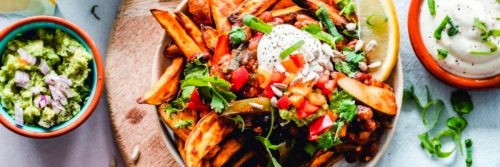Your brain is always “on.” It takes care of your thoughts and movements, your breathing and heartbeat, your senses—it works hard 24/7, even while you’re asleep. This means your brain requires a constant supply of fuel. That “fuel” comes from the foods you eat—and what’s in that fuel makes all the difference. Put simply, what you eat directly affects the structure and function of your brain and, ultimately, your mood.
Depression has become a worldwide epidemic, affecting 350 million people worldwide and 6.9 percent of the United States population. It is now the leading cause of disability worldwide. It is also very treatable—and not just through medicine but also through changes in diet and lifestyle. In fact, scientists are finding that Mother Nature herself has answers for those who suffer from depression—answers that can be just as effective as medicine.
When I was little antibiotics were being given out like sweets. It was the fix for everything, cold, flu, pain etc. Same as birth control pill is being given to young girls without any consideration how it is affecting their gut and mental health. Are we treating one thing but damaging another in the process? It’s time that we look at our health more holistically.
10 years ago I was given 3 courses of antibiotics to treat infection in my wisdom tooth. My doctor didn’t educate me about probiotics or how my gut will be affected. After finishing those antibiotics I got sensitivity to foods with sugar, gluten and dairy and ended up with a bad depression and sleepless nights for months before realising that my gut and intestines were lined with candida.
Conventional medicine is overusing prescription drugs which affects our gut, which then affects our immune system, mood and mental health.
Gut—brain connection
Most of neural chemicals are processed first in the gut.
Have you ever had ‘butterflies’ in your stomach before a big event? Or experienced a change in your appetite or bowel habits when you’re stressed? These are just a few of the many ways that stress can affect your digestion.
Stress
Stress is a huge contributor to inflammation in our gut.
In response to stress our bodies may often initiate a ‘fight or flight’ response. During a ‘fight or flight’ response pupils can dilate, sweating may increase, heart rate can accelerate, and the peristaltic movement normally seen through our digestive system is often decreased. This is because the body is trying to ensure our survival. Part of the way it does this is by shunting blood and energy to the muscles and brain and away from the digestive system—slowing any functions that are not seen as essential to immediate survival.
When we experience stress, and a ‘flight or fight’ response is activated, our digestive system can be significantly affected. The sympathetic nervous system moves blood away to other organs, interferes with the regular contractions of the muscles along the digestive tract and decreases secretions needed for proper digestion.
Stress can have other effects on the digestive system. It may cause an increase in intestinal permeability and may also have an influence on gut flora?—?increasing bacterial adherence and decreasing levels of beneficial bacteria such as Lactobacilli.
There is a very strong connection between inflammation in your gut and increased anxiety and depression.
Firstly we should be asking ourselves: “how can we lower inflammation in our gut?” This could be not only related to food and what we eat but what we also put on our skin in terms of chemicals, what we use in and around our house, from cleaning or candles or air fresheners to pesticides. All these will pollute our body with toxins which creates inflammation around our vital organs to the point that they don’t work as best as they could. That could lead to tiredness, physical and mental fatigue, hormonal imbalance, sleep issues, depression and anxiety.
There are some easy DYI recipes for removing toxins from your house.
Then bringing in some botanicals to help lower inflammation internally such as turmeric powder or essential oil and green tea extract.
Lastly looking at our diet, which could seem daunting for most people. Once we have done the changes around your house and your skincare and perhaps started using essential oils or taking good supplements, we will start feeling better and have the mental bandwidth and energy to start making diet changes to further enhance our health.
Foods recommended to avoid are: sugar, gluten, dairy and soy.
Gluten—I know we have been eating grains for thousands of years, but the grains that we have now are not the same. A lot of mutation and hybridisation has been done over the years to increase shelf life. Our gut doesn’t recognise this as natural and our body’s response is to attack this “un-natural” thing in our gut which causes inflammation. Inflammation is basically a stress response. Which messes up dopamine levels.
Soy—genetically modified, un-natural. Again causing inflammatory response.
More we introducing those foods to our gut more bad bacteria is being created.
Where do we start? As a first step, we have to reduce the stress on our mind and our body. There are some simple ways to do this:
- Meditation?—?it’s been proven that only 5 minutes a day of meditation or breath work will lower inflammation in our body
- Regular exercise
- Diet changes?—?getting good fats, seeds and nuts, probiotics, plant based foods
- Sleep?—?getting enough sleep is KEY. If you are waking in the middle of the night, it may be related to your blood sugar level dipping and your cortisol being released too early.
- Essential oils?—?frankincense, lavender, lemon for inflammation and any tree oils which are grounding. Making sure that the brand of oils you use are pure.
Connect with your body
Start paying attention to how eating different foods makes you feel—not just in the moment, but the next day. Try eating a “clean” diet for two to three weeks—that means cutting out all processed foods and sugar. Add fermented foods like kimchi, miso, sauerkraut, pickles, or kombucha. You also might want to try going dairy-free—and some people even feel that they feel better when their diets are grain-free. See how you feel. Then slowly introduce foods back into your diet, one by one, and see how you feel.







